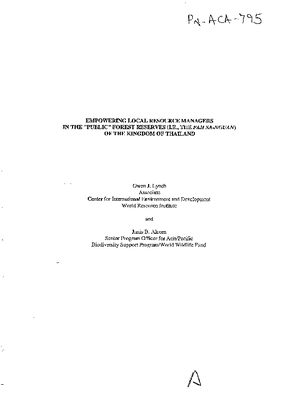Empowering local resource managers in the "public" forest reserves (i.e., the Pah Sa-nguan) of the Kingdom of Thailand
KEYWORD: Community-based Natural Forest Management, Asia. Asia, Thailand, community forestry, incentives, industrial forestry, logging, conservation, forest degradation, forest reserve, land use, reforestation, extension, forest concession, land tenure, policy, property rights, community based natural resource management, conflict, education, poverty abatement, case study, lessons learned. SUMMARY: Thailand's former forest management practices have negatively influenced the country's economic and social development. The government tried to rectify this with new policies, although differing social and environmental resource needs of all involved parties has made this difficult. Making matters worse, the authors argue, people in policy-making roles consistently oversimplified local communities with the stereotype that their resource extraction is destructive and they are not capable of managing forests. This has spawned unfair legislation and increases conflict between the villagers and government. The government proposed establishing a forestry sector master plan and launching a project for relocation of people living in deforested areas, while it increased plantation forestry, community forestry, wildlife protection and other forestry initiatives. Critics of the government programs decry their focus on world markets rather than the needs of local people. Widespread sympathy has arisen for poor and landless people who are resisting army officers and investors who want to create large-scale plantations.The government has responded to this resistance with an initiative to promote community forest management, although this has been criticized as insufficient. In response to the mounting conflicts, the authors present conservation policy recommendations to spur alternative thinking and mutually beneficial solutions. Suggestions include: Securing tenure rights for environmentally astute forest users; Developing forest protection and community forest contracts; Legal recognition of community-based management systems; Emphasis on the important role that foresters and extension agents will continue to play after recognition of community rights;Education and training; Development of additional conservation incentives.Detailed procedural considerations are given for the implementation of these recommendations and sample forest contracts are provided.
https://biodiversitylinks.org/library/resources/rmp/library/content/tools/biodiversity-support-program/copy_of_cbnfm/USAID-BDB-cd-2-data/empowering-local-resource-managers-in-the-public-forest-reserves-i.e.-the-pah-sa-nguan-of-the-kingdom-of-thailand/view
https://biodiversitylinks.org/library/resources/rmp/library/content/tools/biodiversity-support-program/copy_of_cbnfm/USAID-BDB-cd-2-data/empowering-local-resource-managers-in-the-public-forest-reserves-i.e.-the-pah-sa-nguan-of-the-kingdom-of-thailand/@@download/image/image.png
File
Empowering local resource managers in the "public" forest reserves (i.e., the Pah Sa-nguan) of the Kingdom of Thailand
Author(s):
O. J. Lynch
Publication Date: 1992
Location: Kingdom of Thailand
DOWNLOAD FILE
KEYWORD: Community-based Natural Forest Management, Asia. Asia, Thailand, community forestry, incentives, industrial forestry, logging, conservation, forest degradation, forest reserve, land use, reforestation, extension, forest concession, land tenure, policy, property rights, community based natural resource management, conflict, education, poverty abatement, case study, lessons learned. SUMMARY: Thailand's former forest management practices have negatively influenced the country's economic and social development. The government tried to rectify this with new policies, although differing social and environmental resource needs of all involved parties has made this difficult. Making matters worse, the authors argue, people in policy-making roles consistently oversimplified local communities with the stereotype that their resource extraction is destructive and they are not capable of managing forests. This has spawned unfair legislation and increases conflict between the villagers and government. The government proposed establishing a forestry sector master plan and launching a project for relocation of people living in deforested areas, while it increased plantation forestry, community forestry, wildlife protection and other forestry initiatives. Critics of the government programs decry their focus on world markets rather than the needs of local people. Widespread sympathy has arisen for poor and landless people who are resisting army officers and investors who want to create large-scale plantations.The government has responded to this resistance with an initiative to promote community forest management, although this has been criticized as insufficient. In response to the mounting conflicts, the authors present conservation policy recommendations to spur alternative thinking and mutually beneficial solutions. Suggestions include: Securing tenure rights for environmentally astute forest users; Developing forest protection and community forest contracts; Legal recognition of community-based management systems; Emphasis on the important role that foresters and extension agents will continue to play after recognition of community rights;Education and training; Development of additional conservation incentives.Detailed procedural considerations are given for the implementation of these recommendations and sample forest contracts are provided.



